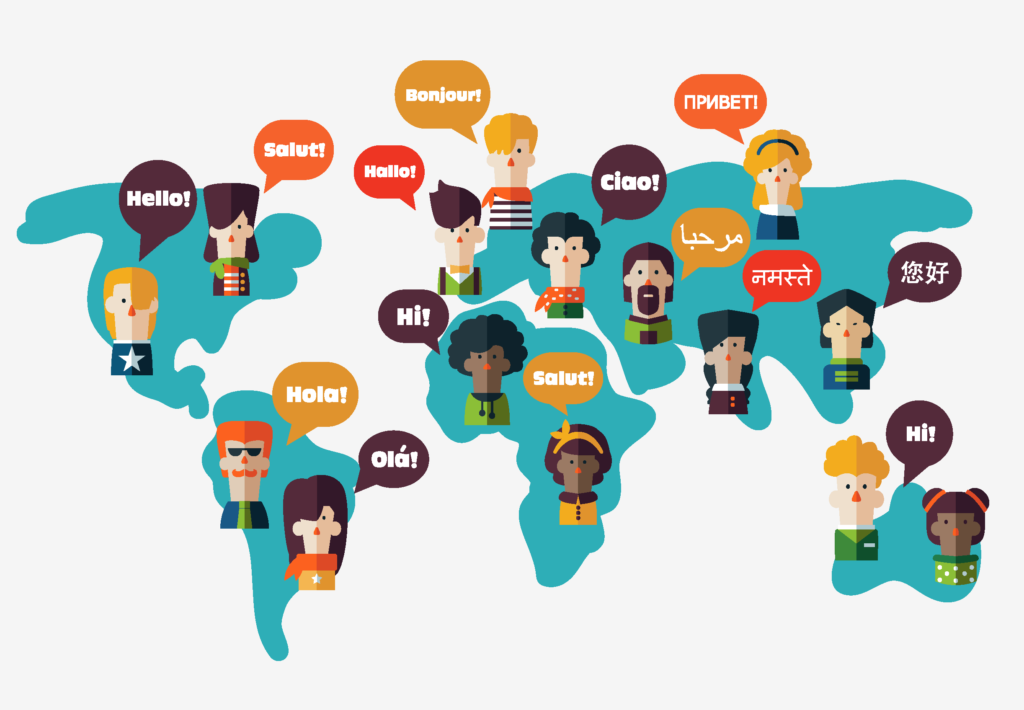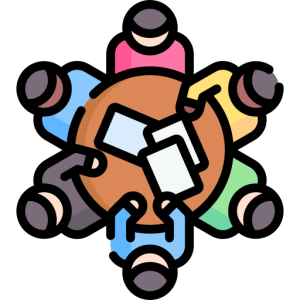1b. Discourse Communities
Overview + Objectives

Image Attribution: Saying hello in different languages by1940162 Hari chandana C is licenced under a CC BY 4.0 licence, via Wikimedia Commons
The first major concept we discuss that will be the foundation of your reading and writing in Writing 121 is discourse community. Considering your discourse community can give your writing its audience, context, and purpose, which are crucial for motivating your writing. In this chapter, we will:
- Define discourse community
- Identify the various discourse communities of which you are a part
- Understand how a discourse community shapes your writing
- Consider ways to craft a unique voice within a discourse community
- Reflect on how knowledge of discourse community can improve your writing
What is a discourse community?
To define this concept, let’s break it down into its separate parts: discourse and community. We’ll start with the simpler word, community. A community is simply a group of people who are joined together by something they have in common. It could be a shared interest, such as a gaming community, a set of beliefs, such as a religious community, a similar geographical location, such as a local community, or a profession, such as the academic community. A family is a type of community. Your friends also form a community. Take a moment and think of the various communities to which you belong. What binds individuals together in these communities? Do members of these communities engage with each other virtually or in real life?
Next let’s look at the other word in this term, discourse. The word in its original usage meant reasoned argument or thought. However, in contemporary usage we sometimes think of it generally as any written or spoken communication, a conversation. We more often use it to refer to written or spoken communication related to a particular intellectual or social activity, such as scientific discourse or political discourse. In this sense, a synonym for discourse might be language. A discourse is defined by its unique language, vocabulary, themes, ideas, values, and beliefs. Think about your major. What are the unique characteristics of the discourse in your disciplinary or professional field?
Now let’s put our two words together, discourse community. Any guesses on what it means? If you are thinking that it is a group of people—real, imaginary, virtual, or otherwise—with shared interests, goals, language, and ways of communicating, then, yes, you’ve got it!

Image Attribution: Your WR 121 discourse community Discussion icons created by Freepik – Flaticon.
What does a discourse community look like?
Let’s work through a few examples. The following are five lists of words. Do you recognize any of the groups of words and what they have in common?
- CPA, general ledger, liabilities, return on investment, owner’s equity, net income, expenses (fixed, variable, accrued, operation)
- ISO, aperture, depth of field, autofocus, exposure, shutter speed
- gracias, de nada, salud, buen provecho, estadounidense, te quiero
- iron throne, direwolf, Khaleesi, the Wall, Valyrian steel, Night Walkers
- once a Duck always a Duck, show your “O,” Carson, EMU, it never rains in Autzen Stadium, Arts and Letters, Social Science, and Science groups




If you are a business major and have taken an accounting class, you’ve likely learned about the set of words in #1. If you are a photographer, you probably know the terminology in #2. If you speak Spanish, then you understand the words in #3. If you’re a Game of Thrones fan, then you recognize the words in #4. And if you are a UO student, then the words in #5 should seem familiar to you. Sco Ducks!
So you can see that discourse, or language, is one way that a community is bound together. It shapes it, strengthens it, and even defines it. The members of the community generally agree on what the terms mean; however, that is not always the case, as we will explore later in the course.
But what if you didn’t know a group of words? Let’s say you are in a conversation with a group of people using the technical terms in #2, but your only camera is your iPhone. Or perhaps you are reading an article that is in Spanish, but you don’t know that language. How would you feel? You would probably feel confused, frustrated, and excluded.
Because language and modes of communication differ among various groups, a discourse community can exclude others as much as it brings people together. Think about one of the communities to which you belong. What is the discourse of that group? What is the shared language and terminology? What are the primary ways of communicating between members of the community? How do members communicate their ideas or activities with those outside of the community?
What is a discourse community to which you belong and. . .
- What are the unique characteristics of communicating within this community?
- How has it shaped the way you think and write?
- Is it possible to assert your unique voice within that community? How so or why not?
Images (above, from left to right):
- Balance sheet: RODNAE Productionsfrom Pexels
- Photography: Pxhere
- Dany: Creative Commons
- Puddles the Duck by Brian licensed under a CC BY SA 4.0 license via Wikimedia Commons
How does the discourse community shape your writing?

Image Attribution: Workshop by fauxels via Pexel.
In his book on academic writing, The Shape of Reason, John Gage defines a discourse community as “any kind of community in which the members attempt to achieve cooperation and assert their individuality through the use of language. We are all members of discourse communities, each of which uses language in different ways” (2).
What keywords can you pull out of this definition? I identify the following keywords: cooperation, individuality, and language. A community generally assumes members who cooperate with each other. The group has a common goal or set of goals and its members want to work or live together to achieve those goals. They use a common language and mode of communication to maintain and strengthen the community. For an individual to thrive within this community, understanding and being able to use that common language and mode of communication are essential. When we as individuals have thoughts, ideas, or actions we would like to share with others in the community, we want to convey those thoughts, ideas, or actions in a way that others can understand and engage with them. No one likes to feel misunderstood. In this way, a discourse community influences how we communicate our individuality to the group.
We can illustrate how discourse community shapes your writing with a few examples. It is probably easy and fun for you to write and send texts to your friends. What kind of language do you use when texting? If your friend’s primary language is English, then you’ll probably use English in your texts. You’ll probably also use textspeak abbreviations like “lol” and “idk.” You might even use some visual language, such as emoji or gifs. If your friend does not speak English, does not know what the abbreviations stand for, or is unfamiliar with emoji, then they will not understand your message. Now, let’s say you are sending an email to your professor. Would you use the same discourse that you use when texting your friend? Probably not. In other words: an awareness of discourse community probably already shapes how you communicate your ideas.
This is all well and good when you feel confident about your membership in a community. But what about when you are new to a community? How do you learn that community’s discourse? Or what if you struggle to feel like you truly belong in a community? How do these things affect how you communicate and interact with the group? As you become more familiar with a community’s discourse, your written communication with the group will also improve. However, do you think it is possible to assert your unique voice and identity within the limits of a community’s discourse?
Let’s consider the university as a discourse community. The university comprises intellectuals (including you!) in various academic disciplines. Each academic discipline has its own discourse, but for the most part all academic disciplines communicate and share knowledge, as well as debate theories and ideas, through discussion and writing. What characterizes academic discourse? What is academic writing? Who gets to speak and write in this community?
Once you have read the sections on discourse community and thought about the various communities of which you are a part and the discourses used in these communities, you’re ready to get to know your WR 121 discourse community. What can you learn about your peers and instructor? What languages do they speak? What common goals do you all share? Do you agree on what effective writing looks like? What support will you offer each other as you work on your writing this term?
Acknowledgment:
Gage, John. The Shape of Reason, 4th Edition. New York: Pearson, 2006: 2.

